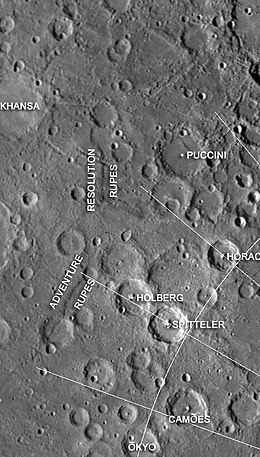Adventure Rupes
 | |
| Feature type | Rupes |
|---|---|
| Coordinates | 65°06′S 65°30′W / 65.1°S 65.5°W / -65.1; -65.5Coordinates: 65°06′S 65°30′W / 65.1°S 65.5°W / -65.1; -65.5[1] |
| Length | 270 km[2] |
| Eponym | HMS Adventure[1] |
Adventure Rupes is an escarpment on Mercury approximately 270 kilometres (170 miles) long located in the southern hemisphere of Mercury.[1] Discovered by the Mariner 10 spacecraft in 1974, it was formed by a thrust fault, thought to have occurred due to the shrinkage of the planet's core as it cooled over time.[2]
Adventure Rupes has an arcuate shape with the scarp face on convex side of the arc. It has a relief of about 1.3 km and is a continuation of Resolution Rupes and Discovery Rupes along a rough arc, which extends for more than 1000 km. Adventure Rupes is separated from Resolution Rupes by a high relief ridge informally named Rabelais Dorsum, which crosscuts the scarps. This means that Resolution Rupes and Adventure Rupes may be parts of one large structure similar in length to Discovery Rupes.[2]
The scarp is named after HMS Adventure, one of James Cook's ships on his second voyage to the Pacific, 1772–1775.[1]
References
^ abcd "Adventure Rupes". USGS. Retrieved July 18, 2010..mw-parser-output cite.citation{font-style:inherit}.mw-parser-output .citation q{quotes:"""""""'""'"}.mw-parser-output .citation .cs1-lock-free a{background:url("//upload.wikimedia.org/wikipedia/commons/thumb/6/65/Lock-green.svg/9px-Lock-green.svg.png")no-repeat;background-position:right .1em center}.mw-parser-output .citation .cs1-lock-limited a,.mw-parser-output .citation .cs1-lock-registration a{background:url("//upload.wikimedia.org/wikipedia/commons/thumb/d/d6/Lock-gray-alt-2.svg/9px-Lock-gray-alt-2.svg.png")no-repeat;background-position:right .1em center}.mw-parser-output .citation .cs1-lock-subscription a{background:url("//upload.wikimedia.org/wikipedia/commons/thumb/a/aa/Lock-red-alt-2.svg/9px-Lock-red-alt-2.svg.png")no-repeat;background-position:right .1em center}.mw-parser-output .cs1-subscription,.mw-parser-output .cs1-registration{color:#555}.mw-parser-output .cs1-subscription span,.mw-parser-output .cs1-registration span{border-bottom:1px dotted;cursor:help}.mw-parser-output .cs1-ws-icon a{background:url("//upload.wikimedia.org/wikipedia/commons/thumb/4/4c/Wikisource-logo.svg/12px-Wikisource-logo.svg.png")no-repeat;background-position:right .1em center}.mw-parser-output code.cs1-code{color:inherit;background:inherit;border:inherit;padding:inherit}.mw-parser-output .cs1-hidden-error{display:none;font-size:100%}.mw-parser-output .cs1-visible-error{font-size:100%}.mw-parser-output .cs1-maint{display:none;color:#33aa33;margin-left:0.3em}.mw-parser-output .cs1-subscription,.mw-parser-output .cs1-registration,.mw-parser-output .cs1-format{font-size:95%}.mw-parser-output .cs1-kern-left,.mw-parser-output .cs1-kern-wl-left{padding-left:0.2em}.mw-parser-output .cs1-kern-right,.mw-parser-output .cs1-kern-wl-right{padding-right:0.2em}
^ abc Watters, T.R.; Cook, A.C.; Robinson, M.S. (2001). "Large-scale lobate scarps in the southern hemisphere of Mercury". Planetary and Space Science. 49 (14–15): 1523–1530. Bibcode:2001P&SS...49.1523W. doi:10.1016/S0032-0633(01)00090-3.
This article about the planet Mercury is a stub. You can help Wikipedia by expanding it. |